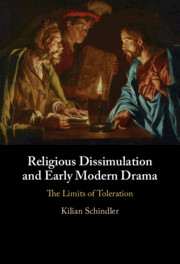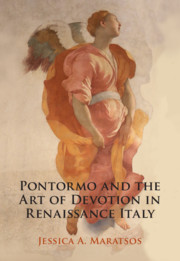Refine search
Actions for selected content:
9 results
Abraham, David, and the Problem of Exile in Calvin’s Theology
-
- Journal:
- Harvard Theological Review / Volume 118 / Issue 2 / April 2025
- Published online by Cambridge University Press:
- 30 July 2025, pp. 314-336
- Print publication:
- April 2025
-
- Article
- Export citation
Chapter 1 - Religious Dissimulation and Toleration in Early Modern England
-
- Book:
- Religious Dissimulation and Early Modern Drama
- Published online:
- 31 August 2023
- Print publication:
- 28 September 2023, pp 27-47
-
- Chapter
-
- You have access
- Open access
- HTML
- Export citation
Introduction
-
- Book:
- Religious Dissimulation and Early Modern Drama
- Published online:
- 31 August 2023
- Print publication:
- 28 September 2023, pp 1-26
-
- Chapter
-
- You have access
- Open access
- HTML
- Export citation

Religious Dissimulation and Early Modern Drama
- The Limits of Toleration
-
- Published online:
- 31 August 2023
- Print publication:
- 28 September 2023
-
- Book
-
- You have access
- Open access
- Export citation

Pontormo and the Art of Devotion in Renaissance Italy
-
- Published online:
- 12 January 2022
- Print publication:
- 09 September 2021
7 - Reforming the Conscience
- from Part II - Conscience According to Major Figures and Traditions
-
-
- Book:
- Christianity and the Laws of Conscience
- Published online:
- 12 June 2021
- Print publication:
- 24 June 2021, pp 132-151
-
- Chapter
- Export citation
13 - Compromise Refashioned
- from Part III - Lives and Afterlives
-
-
- Book:
- Memory and the English Reformation
- Published online:
- 30 October 2020
- Print publication:
- 12 November 2020, pp 257-270
-
- Chapter
- Export citation
Part IV - The Religious Question
-
- Book:
- John Calvin in Context
- Published online:
- 14 November 2019
- Print publication:
- 05 December 2019, pp 165-296
-
- Chapter
- Export citation
31 - Early Modern Christianity and Idolatry
- from Part IV - The Religious Question
-
-
- Book:
- John Calvin in Context
- Published online:
- 14 November 2019
- Print publication:
- 05 December 2019, pp 267-277
-
- Chapter
- Export citation
